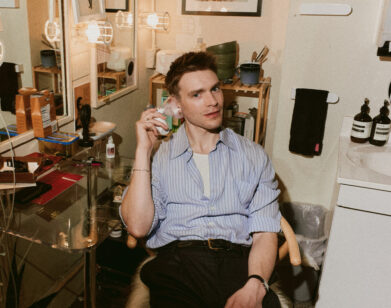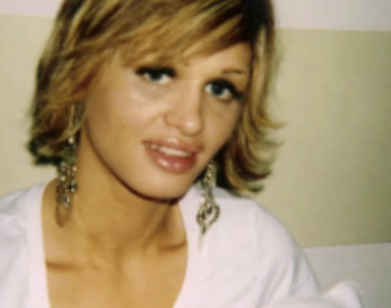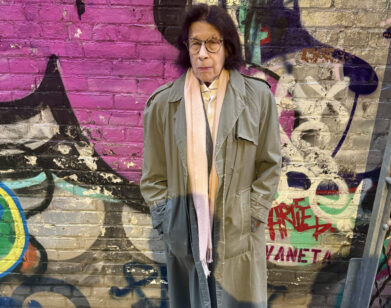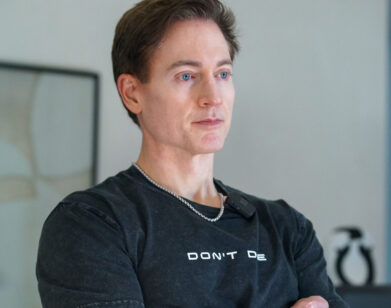binge watch
Jeremy O. Harris and Mel Ottenberg on Fran Lebowitz, Veneno, and That Duke from Bridgerton
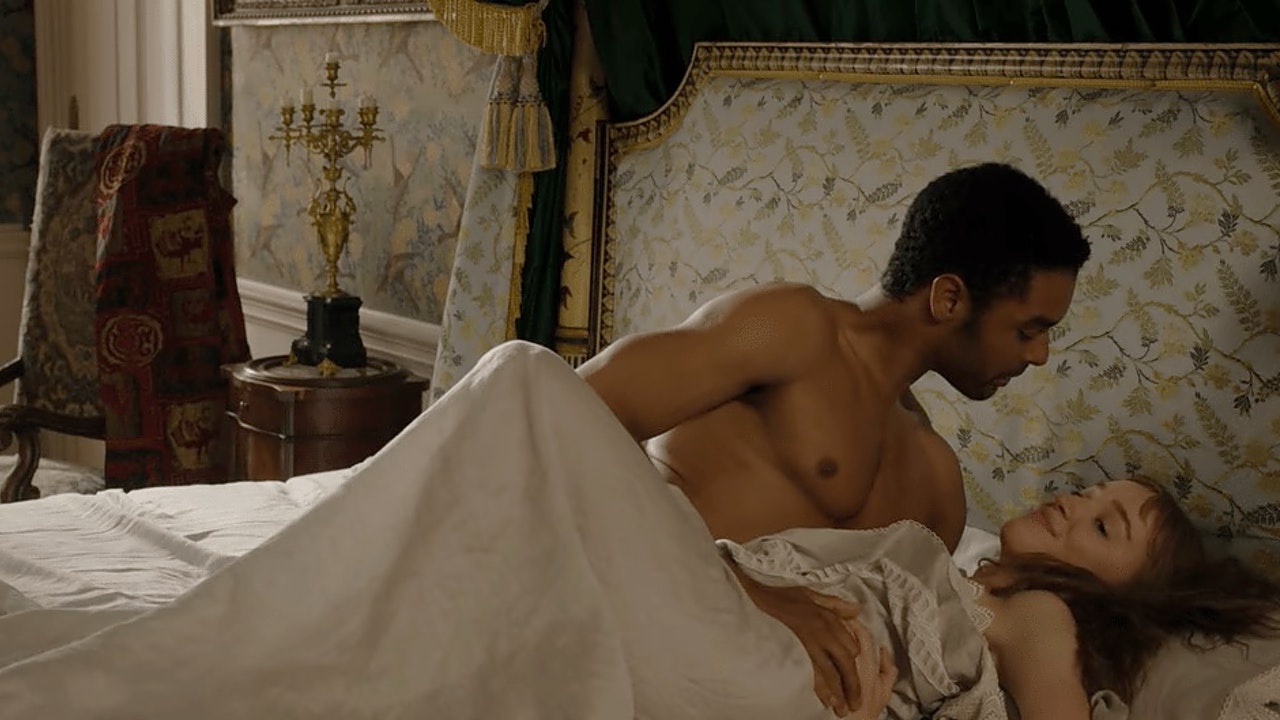
Bridgerton.
As the real world remains in the dark due to the ever-evolving COVID-19 pandemic, and the halted distribution of the elusive vaccine, television has become a central force of entertainment in nearly every New Yorker’s quarantined reality. From the tragic story of Spanish trans icon Cristina La Veneno (HBO Max) to Bridgerton, a tale centered on a group of horny teens in in London in 1813, to the masterful love letter to New York City through the wit and nostalgia of Fran Lebowitz, the streaming gods keep on giving us stories to devour and dissect. As you know, we love to talk here at Interview, it’s what the people want. After a trip to Paris with Emily, our Creative Director Mel Ottenberg and the playwright Jeremy O. Harris reunite to talk about Veneno, Bridgerton, and Pretend It’s a City—the hottest, most fascinating shows of the season. –ERNESTO MACIAS
———
MEL OTTENBERG: Hi, Jeremy. Thanks for doing a conversation with me about the television shows we’re watching.
JEREMY O. HARRIS: I always love doing a conversation with you.
OTTENBERG: Let’s discuss Bridgerton, Pretend It’s a City, and Veneno. Did any of these three shows hit you as hard as Emily in Paris did?
HARRIS: I would say no, but I do think that they affected me very differently. I think mainly because I was in Paris when I watched Emily in Paris. That was an entirely different experience. I couldn’t be in Regency England, or Spain watching Veneno.
OTTENBERG: Right, you were really feeling your oats in Paris while watching Emily in Paris during High Fall COVID.
HARRIS: Yes. Also, I do have to say that being in New York while watching Pretend It’s a City is a very different experience because I feel like I’m alienated from New York right now. I feel like I can’t pretend it’s a city because I’m inside my apartment, which is a sort of non-place.
OTTENBERG: Right.
HARRIS: How do you feel? Does this city feel like a city in COVID?
OTTENBERG: I’m so into New York right now. But here’s a thing that I know about New York regarding your vibe. New York will temporarily forget about you when you’ve been gone for a really long time. I used to be gone from New York so much and while I didn’t lose any friends from that, people just kind of forgot that I lived here. I’d come back and wouldn’t really see anybody. I’d see New York people around the world wherever I was more than I did at home. I guess you’re feeling that because New York has been feeling kinda nice recently.
HARRIS: [Laughs] Yes.
OTTENBERG: When COVID happened, I came home from Berlin and it was so weird here, of course. The whole city stopped, so scary, blah blah blah, we all know. I had been over New York for a while so in June I went to L.A. thinking I would probably never come back, and I was not into it. L.A. really is my favorite place on earth but we’ve broken up for now. I came back here and was like, “The world is hell but in NYC you can go to Via Carota or Il Buco and get a table right away and sit outside and it’s a vibe, so it’s really okay.”
HARRIS: What’s funny to me, Mel, is that you’re the second person I know who had this sort of imagined Lana Del Rey escape to L.A. My roommate did the same. At the start of COVID, he and his wife got married and they decided that they wanted to move out of the apartment and move to L.A. They just decided after four months in L.A. that L.A. is the worst city and they want to move back to New York, which feels very Pretend It’s a City to me.
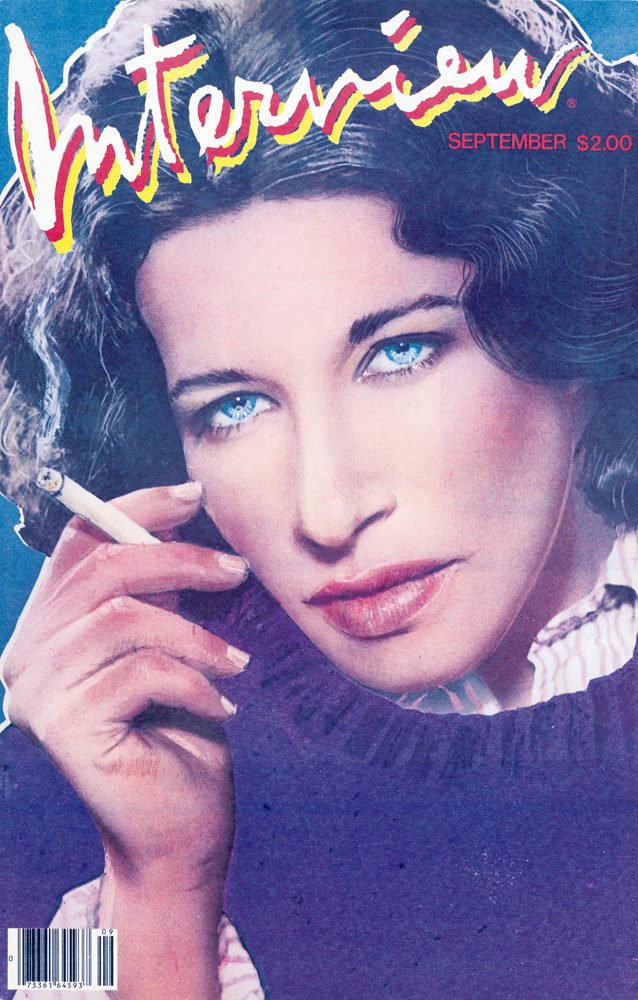
Fran Lebowitz on the cover of Interview, 1972.
OTTENBERG: Absolutely. You know, I have loved L.A. for 20 years, and I’ve been complaining about New York possibly as much as Fran Lebowitz complains about New York in Pretend it’s a City. I’ve always known where and how to have fun in New York, but I was over it. But, man, when I went to L.A. this summer, I have never felt more lonely in my entire life. It was a loneliness that was really profound. I felt daily like Philip Seymour Hoffman in a really sad Paul Thomas Anderson movie about an L.A. loner with no friends. Anyway, I’m back here in NYC. And I’m good.
HARRIS: My roommate felt the same way. He felt really lonely in L.A. He also is a consummate city kid. He grew up in D.C. He also never learned how to drive. He’s been like, “I don’t know how to walk in this city. I just miss being able to bump into people and go to art shows and do this and do that.” I don’t have that same love of New York’s hustle-bustle busy-body-ness. I live for New York for the drama and the gag, but I also have no allegiance to the city, which is part of the reason why listening to Fran Lebowitz is so exhausting. Because it’s like, first of all, you’re not even from here.
OTTENBERG: Well, she is. For the record, you don’t have to be born here to become a real New Yorker.
HARRIS: I know that. She makes a great point about that. I just think it’s annoying to have so much allegiance to a place. It’s like people who are like, “I’m so happy to be an American.” I’m like, “Why? Yuck.” How incurious are you that this little island of overpopulation, shit on the streets—some dog, some human—is so special to you that you can say it’s better than Tokyo or Dubai or Accra, Ghana? This is a city, and it’s an interesting one. There’s a lot of things to like about it, but mainly it’s shitty. Real estate sucks here.
OTTENBERG: Nightmare.
HARRIS: I have no space. I feel like I can never get a real breath of fresh air. I feel like the sort of culture that we’ve talked about being the heartbeat of this city has now been democratized because of digital imperialism. All of culture exists now on TikTok, Twitter, Instagram, or Pinterest. You don’t need to go to New York City to see the great new painting because the painter has probably already uploaded it onto Instagram and been written about in Interview magazine.
OTTENBERG: Wait, you think you could live anywhere now, as long as you had the perfect setup?
HARRIS: Actually, yes.
OTTENBERG: You could live that great vampire lifestyle in Only Lovers Left Alive, with the house and the vintage car.
HARRIS: Yes, yes, yes, yes, yes.
OTTENBERG: Maybe that’s a look for living in the future. Shit. Great metropolis not needed because it’s all virtual.
HARRIS: I think that is the look of the future. That’s what annoys me about Fran—her existence is so about her past, which exists as her present. Her present is the 1970s, or nostalgia for it. I don’t know that one who looks toward nostalgia as the understanding of all moments of human existence is someone that we should be holding up as a great intellectual. I do think that maybe she peaked at being a great wit and became a great intellect, but was never a great intellectual because she lacks curiosity about the present world. Which, again, is why she’s maybe not an artist like the people that she admires. She’ll only ever be an amazing commentator. That’s not a bad thing. It’s just a fact about her. She was more comforted by being a curmudgeon than being creative.
OTTENBERG: I enjoy watching the curmudgeon thing right now because I’ve been enraged by the universe for the last 10 months. But I will say that I don’t think she and I would necessarily get along. Maybe we would because we’re both Jews. Maybe we would because we both wear Levi’s. Maybe we would because we’re two gay New Yorker Jews in Levi’s, whatever. Of all the shows we’re talking about, I’d much rather sit next to Cristina La Veneno at a dinner party or the cute little lesbian sister in Bridgerton than Fran. That’s not a diss on Fran, I’ve worshipped her since middle school. But sometimes it’s hard to meet your heroes. I do love hearing about the old New York and getting first-hand Warhol stories.
HARRIS: Hold on. I just need to say this really quickly. I have had dinner with Fran Lebowitz.
OTTENBERG: Oh, tell us.
HARRIS: Literally right before the breakdown of civilization, Fran Lebowitz and I had dinner after a talkback at The Kitchen. We did a panel at The Kitchen together. It was amazing. I will say this. I get along with any intellectual smoker. Any intellect with a cigarette, I’m like, “Fuck yes. Let’s split a fag and chat it up.” She and I got along so well. That’s why I feel very confident giving my critique of her. Because she felt very confident giving her critiques of me and my youth. At the end of the talk, I said something about late capitalism. She was like, “You young kids. You love to talk about late capitalism. Well, let me tell you something. If you think this is late, you’ve already missed the boat. You don’t know what you’re talking about.” A month later, everything’s shut the fuck down because of coronavirus and I got a message that she recanted her statement. She said, “This does feel like a great reset.”
OTTENBERG: How interesting. I wish I had been there.
HARRIS: I do think that you’re right that Veneno would be an amazing addition to our dinner party with Fran. Because Veneno, for me, represents all of my ideals of living in a city in the ’90s. That’s what I dream of.
OTTENBERG: Veneno, to me, is about ruling. About using your power. Cristina la Veneno was all about using the power of her kitty and owning that fucking city. I love that. I remember being an intern in New York and I had errands to run and I couldn’t figure out which direction I was supposed to go in. And I was looking at these huge billboards in Manhattan and dreaming of a future here in which I would belong to the fashion world and would understand my north, south, east, and west.
HARRIS: I still don’t know the difference.
OTTENBERG: You will. It’ll come to you, except for some parts of the Village, and the Financial District. I was an intern looking at these billboards and I was like, “Someday, I’ll be a part of this fucking city and I’ll have huge billboards with my work on them.” So anytime there’s a billboard with my work on it I take a moment to appreciate that frustrated kid I once was who didn’t know anybody or how to do anything. I really remembered that feeling while watching Veneno. She went to Madrid and got it together and ate the whole fucking town alive with her cuntiness.
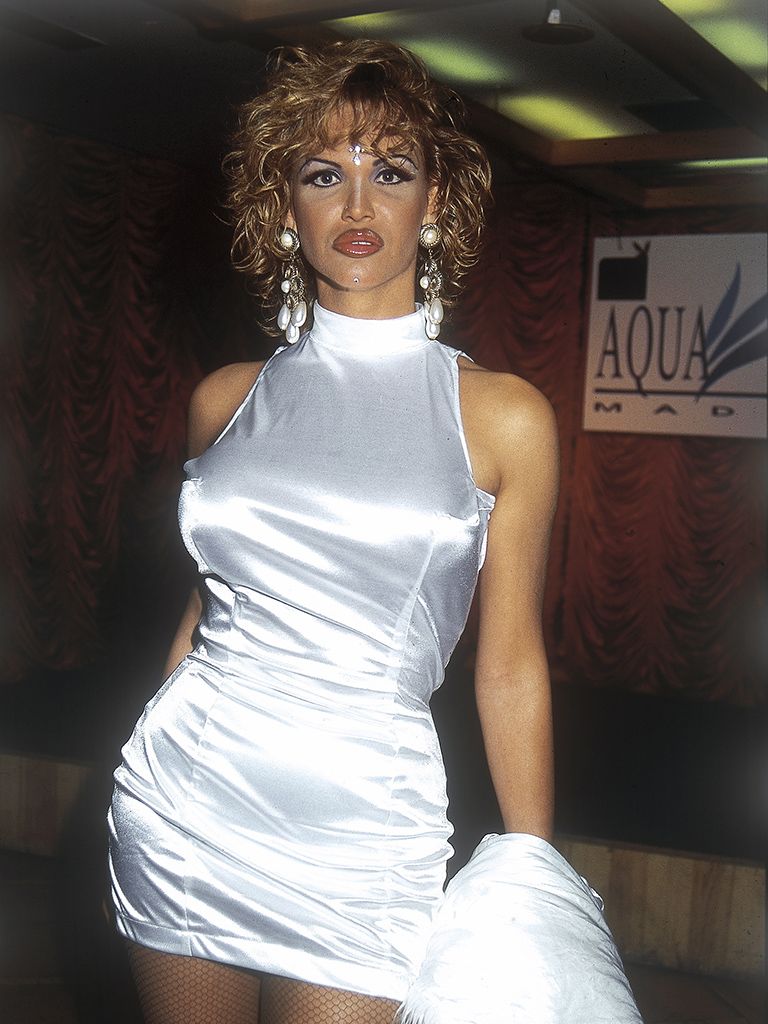
Cristina la Veneno, sometime in the ’90s.
HARRIS: Very much so. And what I love as well about the show is that it’s not well-written, necessarily. I hate the framing device of Valeria. I also hate the fact that everything in Valeria’s life is used as a blatant foil to what’s happening in Veneno’s life. If you see Veneno having trouble getting a boyfriend in the past, then you’ll see Valeria… Because of Veneno’s existence and her impact on the culture, now able just to have a normal relationship with a cis guy.
OTTENBERG: A dream cis guy.
HARRIS: Yeah. A dream cis guy.
OTTENBERG: A dream 2030 boyfriend, really.
HARRIS: Yes, yes. Who feels like he has a great dick, will fuck you against the bathroom counter. Watching it with my trans roommate, we were having this whole conversation about how it feels like a fantasy that devalues the complications of modern queer life. The fact that people like Veneno are a part of the cultural landscape of understanding our bodies and who queer people are. That was a really interesting thing about the show. But what’s exhilarating about it is that it’s able to fight past all of the things that are hokey and saccharine about the show in order to present to us one of the most unparalleled, unabashedly, rich characters I’ve ever seen. Because Veneno is kind of a villain. She’s not a good person. Yet we revere her and all of her complications. I think that as far as queer representation goes, not just specifically trans representation, but I think post-Marriage Act, I haven’t seen creators be brave enough to actually say, “Queer people are human beings so much so that they also can be fucking cunts.”
OTTENBERG: Yeah. Maybe Veneno is the first time you see trans representation on TV where the character is a hero that is free from needing to be acceptable to the straight world. The character is just fucking fierce. Yes, she’s a hooker. Yes, she’s a drug addict. Yes, she’s a fucking nightmare and a con and—
HARRIS: Evil to her friends.
OTTENBERG: And we worship her regardless of those complications. The show doesn’t glorify any of that. But she’s still incredible, even though she’s a nightmare. And you believe her cuntiness ruling the park and the talk shows. She’s real.
HARRIS: After I finished the show, I was in tears. I texted Casey from HBO and I was like, “Casey, I hope to god you all are giving these women the best Emmy and Golden Globes push of any actresses.” Can you style me in the outfit that Veneno wears to that fair? Because I’m obsessed with it.
OTTENBERG: A million percent. By the way, I wanted to tell you I really want to style you just like Fran, too. Fran’s style is flawless. Let’s investigate cuffs links in 2021. But yes, that fucking Veneno at-the-fair outfit. More ruffles, bitch!
HARRIS: Wait, have you looked up the real Veneno videos? She is so incredible.
OTTENBERG: I cannot fucking deal with how hot real ‘90s Veneno is. She with the chin and forehead bindi. So hot.
HARRIS: It’s wild to me how photorealistic so many of those moments in the show are. They really slayed on a costuming and makeup level. The outfit that she wears the first night they discover her sex working, which is the real outfit—
OTTENBERG: You mean the red titties-out thing?
HARRIS: Yes. That was the outfit the real Veneno wore. You can YouTube it. It’s so hot. I want it. That is the costume for Halloween 2021.
OTTENBERG: Yes it is. Veneno was able to see a vision for herself and create a world for herself. Growing up gay can be so hard, and I think we all have moments in our hometown where we think, “This ain’t my life. I’m getting the fuck out of here and I’m going to be this thing that I wanna be.” Even when Veneno doesn’t have her girl look right at the beginning and everyone’s laughing at her and telling her to get lost, she believes she will get it together and rule that park with a soft glove. Period.
I started going to clubs when I was 15 and the D.C. club teens in the early ‘90s were so fucking mean. Evil. They were stunting in major looks in D.C. back then. And these other teens made fun of me for wearing Junior Gaultier when they were in runway collection Gaultier. And I was always like, “Whatever, I am 15 and on acid and these kids are reading me and it’s traumatic but I look cute in Junior Gaultier and it’s fine, I’m in 10th grade. I will eat it up because I’m taking in all the music and the shade and the looks and I will go to New York and do this much better than these evil provincial D.C. teens, thank you very much.” That evil conditioned me for challenges in life. In the end, when Veneno is dancing around to “Always On My Mind” by Pet Shop Boys and she becomes all the different Venenos dancing, I cried. I actually cried watching it. It really moved me. That’s also my official breakup song, by the way.
HARRIS: It is?
OTTENBERG: Well, I have many breakup songs, but I think of all the breakup songs, that’s my song. It’s really saying, “I fucked everything up with us but it really was amazing, so, fuck it, let’s dance.”
HARRIS: I just want to see the list of how many men you’ve ruined and how many times you’ve had to play that song.
OTTENBERG: I think everyone is just fine, but there’s a few. Shout out to them.
HARRIS: I feel bad for any queer who hasn’t had to fabulate in order to make sense of themselves in the world. That is at the core of Fran’s story and also the story that is a part of Veneno. For queer people, fabulating your identity, constructing new universes for yourself is the only way to survive in the midst of utter oppression. And that was something I connected to so deeply in all of the shows we watched, including Bridgerton.
OTTENBERG: A hundred percent.
HARRIS: I think out of the three shows, it was the one that I enjoyed unabashedly the most without any sort of mental calculation because it knew what it was. It was so utterly a fabulation. That sort of idea that we can project ourselves, these Black and queer and brown people, into Regency England in a romance was so, so, so, so exhilarating and fun and funny that I was a little disappointed in episode three—spoiler alert—when they try to make sense of it for the Twittersphere. I didn’t need any of that. “Well, before, when he fell in love with the queen, we were trash.” I don’t want to know that people were niggers before this. I want to know that we’ve always been able to be whoever we wanted to be, including in this Regency romance. Don’t make sense of it. Just let it be.
OTTENBERG: I’m excited about Bridgerton, too. I’m hot for this show. I have been lost in a costume drama world because contemporary life is disgusting and watching costume dramas relaxes me. But for real nobody wants to look at a bunch of white people right now at all, including white people. And anyway the mix of people in Bridgerton just looks so mega. That Duke?!
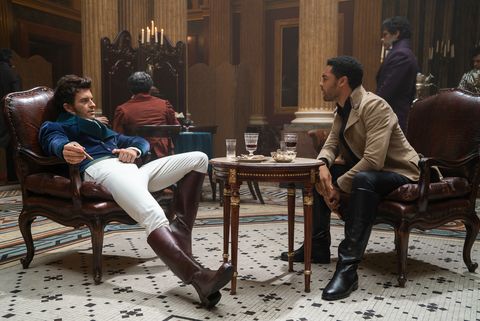
Jonathan Bailey and Regé-Jean Page in Netflix’s Bridgerton.
HARRIS: Yes. Put him on the cover. Just the Duke, in a fucking ascot. That’s all I need.
OTTENBERG: Oh my god.
HARRIS: Straight up D’Angelo music video vibes. I’ve been thinking a lot about the show that I was going to do at Playwrights Horizons right before the COVID thing happened, and how that was my gesture towards my own fabulated world where young Black and brown queer boys are at the center of a Jacobean revenge tragedy. They’re all wearing really sick and cute fencing uniforms. They’re talking in heightened text. It was going to be so freeing, I think, because one of the things that makes being queer complicated is that we can’t imagine ourselves outside of the 20th century.
Maybe we can imagine ourselves in the Greek time, but not really, because they were pederast. Or we can imagine ourselves in Oscar Wilde world, but then we’re going to jail and on trial. I wanted us to be able to imagine ourselves just free and queer and in a Jacobean revenge tragedy. I think that Bridgerton is going to open up the romance genre to so much more. Give me Twilight, but with Zendaya.
OTTENBERG: I want to see more real history worked out on television and in movies that is nasty and brutal, the way it really was. I also want to see fantasy where we don’t have to worry about that and we can see a lot of different types of people in this thing because it’s just fierce. I want to see both.
HARRIS: There’s so much real about Black people that we can go to as well, outside of fantasy, that I think would help bridge some of the gaps of ignorance and amnesia that’s caused by white supremacy that makes us imagine that all of Black life has been subjugation. Because if we look at Reconstruction right after the Civil War, there were more Black people elected to higher office than at any other time in our American history, period. No one really knows that. We don’t know about all the black millionaires that were roaming the streets of New York through the late 1800s, just thriving. Where’s the show about Zora Neale Hurston, Langston Hughes, and all of the freaks that made the fire publications, writing about being queer and fucking whoever they wanted to in the middle of Harlem in the 1920s? That’s a show that we need to have right now.
OTTENBERG: I want it.
HARRIS: Should I write that show?
OTTENBERG: Yeah. I don’t even know if we should be putting this in the interview because I really just want that show.
HARRIS: We should put it in here. That way someone will call me.
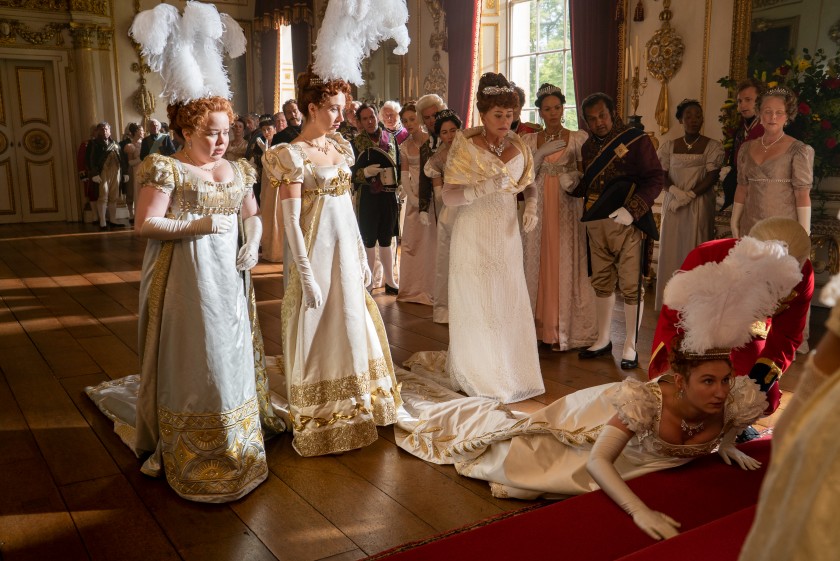
OTTENBERG: Okay, let it be known. The costumes in Bridgerton are fucking hot. I’m always looking for a problem in a detail, like a safety pin on a pair of bloomers in Westworld or a wandering thread, but I don’t have any to report here. And Veneno—those fucking costumes rocked my fucking world.
HARRIS: Can we discuss the fact that those high-waisted Regency pants from Bridgerton are literally the look that all men should be wearing in 2021? It makes your ass look right. It makes your waist look right. Telfar did some looks like that, but in black and gray in the show he did in Milan. I think that that’s the journey for me in 2021.
OTTENBERG: I’m going to help you with that journey. Oh, fuck. I haven’t even talked about my good friend, Sophia Lamar, who was in Veneno as well, and I want to talk about her.
HARRIS: Phenomenal.
OTTENBERG: She’s the OG Cristina. Sophia is one of the coolest people with the best style that I’ve ever known. I remember meeting her in ‘99. We were at The Cock. I believe she was naked. I was not. Glitter was part of the look. Anyways, she was so fab as Veneno’s trans mother and nobody else could have been as perfect and fierce for that role. Okay, Jeremy, we’ve been on the phone for 400 years now, so I’m gonna let you go.
HARRIS: Yes. I do have to start going, unfortunately.
OTTENBERG: What are you up to later?
HARRIS: I have to go and write my TV show.
OTTENBERG: Babe, go write your TV show and I’ll call you later.
HARRIS: Okay. Bye.
OTTENBERG: Bye, babe.


